These men and women represent many different religions, but they’re all spreading the eco-gospel. Read about them, then tell us which spiritual leaders have inspired you to greener heights in the comments section at the bottom of the page.

Ecumenical Patriarch Bartholomew I
“Crime against the natural world is a sin,” says Bartholomew I, leader of more than 300 million Orthodox Christians worldwide. “The Green Patriarch” has thrown his weight behind various international environmental causes, and urges leaders of other faiths to raise environmental awareness among their believers. The winner of both the U.S. Congressional Gold Medal and the Sophie Prize for leadership in environmental protection and sustainable development, Bartholomew I takes his “fisher of men” duty seriously: In 2003, he brought together 200 scientists, political leaders, and journalists on a cruise ship in the Baltic Sea to discuss marine preservation and the hazards of overfishing. “To protect the oceans is to do God’s work,” he says. “To harm them, even if we are ignorant of the harm we cause, is to diminish His divine creation.”

of His Holiness the Dalai Lama
The Dalai Lama
The 14th Dalai Lama of Tibet has been talking up environmental protection since he won the Nobel Peace Prize in 1989. He has said that he considers environmental issues to be among the key challenges facing humanity today — and as an exile whose homeland is under occupation, he’s a man who knows challenges. The U.K. Environment Agency named him one of the top 100 green campaigners of all time last year. This year, the Dalai Lama is offsetting emissions generated by his world tour, and at many of the stops he’s stressing the importance of kindness to the planet. He has been outspoken about protecting forests and wildlife and controlling the spread of nuclear power. He calls a clean environment a basic human right, and declares, “It is therefore part of our responsibility towards others to ensure that the world we pass on is as healthy, if not healthier, than we found it.”

Rev. Sally Bingham
Sally Bingham — an Episcopal priest and the environmental minister at Grace Cathedral in San Francisco, Calif. — brings light to congregations in more ways than one. Via the Interfaith Power & Light campaign, she’s been a leader in encouraging religious groups to purchase green power and conserve energy by, among other things, replacing old-style light bulbs with compact fluorescents. The Regeneration Project, which she heads, recently united leaders from Christian, Muslim, and Jewish faith groups to ask the U.S. Congress and the White House to act on global warming. Bingham previously served on the board of Environmental Defense and San Francisco’s Commission on the Environment, and has earned many accolades for her work, including the Green Power Leadership Pilot Award and the 2002 Energy Globe Award.
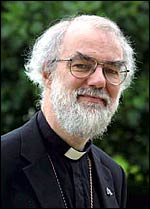
Archbishop of Canterbury Rowan Williams
Use organic bread and wine for Holy Communion. Sell fairly traded products at church events. Carpool. Recycle. All of these were among the recommendations of Rowan Williams, senior clergyman of the Church of England, in “Sharing God’s Planet,” his 2005 report to the General Synod meeting. Williams says Christians have a moral duty to practice “sustainable consumption” and “celebrate and care for every part of God’s creation.” He launched a church-wide national environmental campaign, and, most recently, endorsed a booklet encouraging Christians to play their part in protecting the environment: “How Many Lightbulbs Does it Take to Change a Christian?”
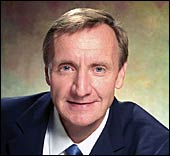
Evangelicals
Richard Cizik
As vice president of governmental affairs for the U.S. National Association of Evangelicals, Richard Cizik uses his significant political sway to raise awareness about climate change and other environmental maladies. Evangelicals should “return to being people known for our love and care of the earth and our fellow human beings,” says Cizik, who travels the U.S. spreading the doctrine of “creation care,” a Bible-based understanding of why Christians have a duty to be environmental stewards. He’s faced criticism from other evangelicals for stealing attention away from homosexuality and abortion, but Cizik remains steadfast in his earth evangelizing. “There are still plenty who wonder, does advocating this agenda mean we have to become liberal weirdos?” he says. “And I say to them, certainly not. It’s in the scripture. Read the Bible.”

Pope Benedict XVI
In addition to using an electric Popemobile on the grounds of solar-power-friendly Vatican City, Pope Benedict XVI has been increasingly vocal about the suffering that climate change will cause for the world’s poor. “The world is not something indifferent, raw material to be utilized simply as we see fit,” he has said. “Rather, it is part of God’s good plan.” He has said that humans must listen to “the voice of the earth,” supported the celebration of a “day for the safeguarding of Creation,” spoken out on the need to protect the Amazon, and denounced factory farming. In his recent Sacramentum Caritatis, he endorsed the need for environmental stewardship guided by Catholic faith: “The justified concern about threats to the environment present in so many parts of the world is reinforced by Christian hope, which commits us to working responsibly for the protection of Creation.”

Fazlun Khalid
Founder and director of the Islamic Foundation for Ecology and Environmental Sciences in Birmingham, U.K., Fazlun Khalid is recognized as the foremost expert on ecology from the Islamic perspective. He has also worked as the director of training at the Alliance of Religions and Conservation and served as a consultant for World Wildlife Fund. Khalid believes that protecting the environment is a form of worship, and that humans have a basic right to the benefits of a healthy planet. “As the guardians of Allah’s creation we have a responsibility to protect the environment,” he says.

Norman Habel
Norman Habel is the editor and a contributing author of the Earth Bible, a Biblical interpretation that incorporates ecology, eco-ethics, and eco-theology. A professor at the School of Theology at Flinders University in Adelaide, Australia, Habel’s work centers on eco-justice and reconciliation. He serves as coordinator for Season of Creation, an initiative that asks Australia’s Lutheran churches to devote a month each year to celebrating creation, much as they celebrate Advent or Lent. “Many people would say it’s a kind of New Age movement in many ways, and that Greenies are a little bit loony in many ways,” says Habel. “But it’s very clear now that more and more people see the crisis of the earth and the crisis for our planet as being something that we all have to face. It’s not something that we can ignore.”

Rabbi Warren Stone
As rabbi of Temple Emanuel in Kensington, Md., Warren Stone has brought a religious element to discussions of the environment and politics in the Washington, D.C., metro area since 1988. Stone has long been active in efforts to protect the Arctic National Wildlife Refuge and combat climate change, and he is founder and chair of the Central Conference of American Rabbis’ Committee on the Environment, co-chair of the Religious Campaign for Forest Conservation, and member of the Carbonfund advisory board. In 1997, the self-declared “environmentalist rabbi” was a United Nations delegate at the U.N. Conference on Climate Change in Kyoto, Japan, where the Kyoto Protocol was forged.

Wellington, New Zealand
Sister Miriam MacGillis
So a Roman Catholic nun founds a farm in New Jersey. No, it’s not a joke — it’s Miriam MacGillis, a Dominican Sister on a mission to save the planet. MacGillis is co-founder of the 226-acre Genesis Farm, a “learning center for earth studies” where “all people of goodwill” are welcomed to learn about and share a love for the earth by working the land. For nearly three decades, this “green nun” has taught impoverished youth from urban areas about organic agriculture, earth literacy, and heritage seed preservation. The farm partnered with other local groups to start the Foodshed Alliance, a grassroots effort to sustain farmers, agricultural lands, and the rural way of life in their region. In 2005, MacGillis received the Thomas Berry Foundation Award for her work.

Rev. Fred Small
Fred Small doesn’t merely preach about the sanctity of creation: he has protested at SUV dealerships, demonstrated at the United Nations, and gotten himself arrested outside a U.S. Department of Energy building for nonviolent civil disobedience on behalf of the Arctic National Wildlife Refuge. A minister at First Church Unitarian in Littleton, Mass., and co-founder of Religious Witness for the Earth, Small believes faith groups need to do more to respond to environmental crises. He recently served as a lead organizer of a nine-day, 85-mile Interfaith Walk for Climate Rescue, during which more than 800 walkers called on the U.S. government to reduce globe-warming emissions 80 percent by 2050. “Living as we do, we are stealing from our children and grandchildren,” says Small. “It’s unconscionable.”

Rev. Joel Hunter
As a megachurch pastor in Longwood, Fla., and a board member of the National Association of Evangelicals, Joel Hunter might seem an unlikely candidate to spearhead a movement of religious-based environmental stewardship — but that’s exactly what he’s doing. He was one of 86 evangelical Christian leaders to sign on to last year’s Evangelical Climate Initiative. Last fall, he was selected as the next leader of the Christian Coalition of America, but declined because of disagreements over whether the group’s priorities should be expanded to include global warming and poverty. “With God’s help, we can stop global warming, for our kids, our world, and for the Lord,” says Hunter, who recently was part of a coalition of more than 20 major religious groups urging the U.S. Congress and the Bush administration to take action on climate change.

University
Karen Baker-Fletcher
Eco-justice theologian Karen Baker-Fletcher interprets the Bible from an environmental, African-American, and womanist perspective. In her book Sisters of Dust, Sisters of Spirit: Womanist Wordings on God and Creation, she celebrates both traditional nature and urban nature as part of God’s creation. “We are responsible for giving life back to that which has given us life — God and the elements of our planet,” she writes. Baker-Fletcher is associate professor of theology at the Perkins School of Theology of Southern Methodist University, and was keynote speaker at this year’s Interfaith Creation Festival, co-sponsored by Earth Ministry.

Awards
Paul Gorman
Paul Gorman is co-founder and executive director of the National Religious Partnership for the Environment, which brings a variety of American faith groups together with the goal of “caring for all creation.” The partnership has reached well over 150,000 congregations, including every Catholic parish, tens of thousands of synagogues, and Protestant, Evangelical, and Eastern Orthodox churches. Gorman, who also serves on the board of trustees for the Coalition on the Environment and Jewish Life, received the 1999 Heinz Award for the Environment for his work in bridging religion, spirituality, activism, and social justice.

Father Thomas Berry
Raised in the hills of North Carolina in a family of 15, Thomas Berry entered a monastery at the age of 20 and later went on to a prodigious career as a spiritual leader, academic, and historian of the earth. An ordained Catholic priest who attests that the environmental crisis is fundamentally a spiritual crisis, the 93-year-old Berry is widely regarded as the most important eco-theologian of our time — or, as he describes himself, an “Earth scholar” or “geologian.” He spent 25 years as the director of the Riverdale Center of Religious Research in New York City, and became a well-regarded lecturer on the intersection of culture and ecology. “The destiny of humans cannot be separated from the destiny of earth,” writes this widely published author, who has covered subjects including Buddhism, the religions of India, and the cosmos.
Runners-Up

WireImage
Archbishop Emeritus Desmond Tutu
In a recent address to mark World Environment Day, Archbishop Emeritus Desmond Tutu asserted that world leaders who continued to ignore climate change were violating the rights of future generations. “We must act now and wake up to our moral obligations. Ignoring global warming is a sin, and the future of our beautiful planet is in our hands,” said the South African Anglican cleric, a leader of the anti-apartheid movement, winner of the 1984 Nobel Peace Prize, and now an anti-AIDS activist. His commitment to human rights feeds his concern about global warming, as he notes that the poor will suffer most from the droughts, floods, and other ravages of climate change.
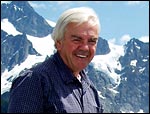
Calvin DeWitt
For more than 25 years, Calvin DeWitt combined his passions for biology and Christianity as director of the Au Sable Institute of Environmental Studies, an academic institution that promotes Christian environmental stewardship. DeWitt, who teaches environmental studies at the University of Wisconsin in Madison, is also co-founder of the International Evangelical Environmental Network and former president of the Christian Environmental Council. “The Bible is an ecological handbook,” DeWitt says. “I shock some of these evangelical congregations by saying Jesus almost always taught on field trips. They’re thinking of him all dressed up and standing behind a pulpit in the church. Jesus was earthy.”
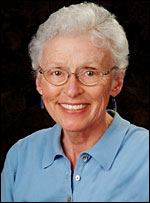
Sallie McFague
Theologian Sallie McFague spent 30 years teaching at Vanderbilt University’s Divinity School, where she united Christian theology with economics and ecology. Her many writings on the subject have included the books The Body of God: An Ecological Theology, Life Abundant: Rethinking Theology and Economy for a Planet in Peril and Super, Natural Christians: How We Should Love Nature. Her work espouses an ecological liberation theology and contends that humanity should glorify God by taking care of the earth. “The planetary agenda, the well-being of the whole, is the context within which theology should operate,” writes McFague.

Rev. Jim Ball
As leader of the influential “What Would Jesus Drive?” campaign and a signatory to the Evangelical Climate Initiative, Rev. Jim Ball has been an active player in both public policy debates and on-the-ground social change. He’s president of the Evangelical Environmental Network, a coalition of faith-based communities that believe many environmental problems are fundamentally spiritual problems. Previously, Ball served as climate-change policy coordinator for the Union of Concerned Scientists, and wrote the book Planting a Tree This Afternoon: Global Warming, Public Theology, and Public Policy.
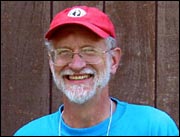
Allen Johnson
As the head of Christians for the Mountains, Allen Johnson rallies Christians against mountaintop-removal mining in the Appalachian Mountains. Johnson says his religious and environmental epiphany occurred while volunteering in Haiti in the early 1990s, and led him to quit his job to attend seminary. “We believe that God made this planet, that God loves the earth, God loves creation, God loves humanity, and that even though God gives us freedom to spin our destiny, God doesn’t want it to be trashed,” says Johnson.
Did we skip over an inspiring green voice? Enlighten us in comments below.
Kate Sheppard contributed to this list.


